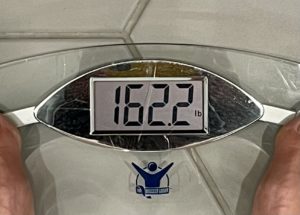Welcome to week two of 2022! Is everyone surviving? Kevin and I were quarantined over the holidays after Graham tested positive for COVID-19 in mid-December (just 4 days after his first dose of the vaccine) but we somehow both managed to remain negative (despite my planting smooches on the kiddo’s face on the daily up until his diagnosis) – I suspect he had the delta variant rather than omicron (since omicron is more infectious), and that our booster shots helped! Now if only we can all remain negative through this surge… seems like it’s EVERYWHERE right now. Hope you all are staying healthy and sane.
Meanwhile, I am one week into my resurrected Project 135 and doing well. My weight yesterday (day 7) was down to 162.2:

That’s 2.2 pounds less than my starting weight of 164.4 on January 1. I’ll take it, since I actually ended up eating some sugar and flour for the last 3 days. (It’s tough to avoid it when it’s in my face calling out to me — we have a lot of candy leftovers from Santa and delicious fancy English muffins gifted to us from our sweet family members!) I don’t know if I’ll ever actually reach 135 pounds, but I’m going to do my best to follow a healthy lifestyle and see where it takes me. I am doubling down today on the “avoiding sugar and flour” thing, because I suspect I could’ve lost at least another pound had I stuck with it beyond the first 5 days of the week.
I was asked by a friend exactly WHAT my plan is — whether it’s just avoiding sugar and flour, or if there’s more to it. And while avoiding sugar and flour is a biggie (and frankly, I find it difficult to do most of the rest when I’m eating a lot of sugar and flour), it’s not the only part. There are the eight basics to my Project 135 plan:
1. Avoid eating added sugars and refined grains or other processed carbohydrates. I’m not anti-carb, just anti-processed carb. Fresh fruit, beans, potatoes with skin, brown rice and other whole unrefined grains are all on plan for me. Bread (including whole grain bread), crackers, white rice, cereal, tortillas, pasta, chips, pretzels, etc. are all examples of foods made from refined grains/flour and should be avoided. Added sugars are also off plan — this includes obvious sources like desserts, candy, muffins, sodas, sweetened coffee drinks and sweetened breakfast cereals, but also sneakier sources such as flavored yogurt, barbecue sauce, peanut butter, ketchup, salad dressings, and fruit juice (which I treat as an added sugar even though it’s not technically “added,” because it takes the fiber away from the fruit and leaves just the sugar). I do allow myself 1-2 squares of very dark (88% cacao) chocolate a day, which technically has added sugar, but it’s not much (just 1 gram of sugar per square of my favorite brand, Endangered Species) and I don’t feel the urge to overeat it. I tried feeding it to a friend and she thought it was disgusting because there wasn’t enough sugar, if that gives you a sense of its level of sweeteness, ha! I also let myself eat pickled ginger (which has added sugar) in my favorite salmon poke bowl, because I don’t eats gobs of it and I don’t like the taste of the raw fish without it.
2. Wait for hunger and stop when satisfied. This is what our bodies were built for — we have physiologic mechanisms that sense when we last ate and what the content of that meal was. They create hunger when we need fuel, and they also create satiety when we’ve met that need. We often ignore those signals and just eat because it’s “time” to eat, because other people around us are eating, or because something looks yummy (like my leftover Christmas candy!). We eat because we are emotionally stressed (anxiety, anger, boredom, sadness) and food helps dampen those negative feelings, or because we are celebrating and bolstering positive emotions with extra dopamine. We overeat (continue eating despite being satisfied) because things taste delicious even though we’ve had enough, because we were taught to clean our plates, or because we hate the idea of wasting food. There are so many reasons why we eat when we aren’t hungry and continue eating even though we’ve had enough, but every time we do this we are overriding our body’s natural intuitive mechanisms that tell us when we actually need food for fuel. (And sugars and refined grains also hijack those intuitive mechanisms, making it much harder to know when you actually need fuel — one of the reasons I eliminate them.)
3. Plan meals ahead of time. We have two conflicting brain systems: our primitive animal brains, which want us to eat all the things all the time because we might not find food again for days (evolutionarily true, but not so much in 2022!), and our more evolved higher human brains, which are capable to delaying gratification, setting goals, and planning for the future. If we let our primitive brains run the show, we will eat constantly, or when any urge strikes. This part of our brain wants us to seek pleasure, avoid pain, and do it by expending as little energy as possible. That’s it. It doesn’t care about our long term health, emotional happiness, or any other human endeavor. You can use your more evolved prefrontal cortex to make choices for yourself that are in line with longer-term goals. By laying out a plan in your head each morning or the night before for everything you will eat that day (and sticking to the plan), you are much more likely to avoid urge-based eating in the moment when you see something yummy that looks good but isn’t going to help your weight. Going to the store with a premade list and sticking to it, looking at restaurant menus online in advance and choosing what you’ll order before you get there and see other people’s meals, etc. are ways of allowing your human brain to get you to your goal and avoiding the hedonist animal within.
4. Fast for at least 3 hours before bedtime, and more if possible. This is based on circadian rhythm and sleep research. Humans are meant to eat during daylight hours, and it takes about 5 hours for a meal to make it through digestion. When your body is busy digesting food when it should instead be repairing itself during sleep, your sleep quality is adversely affected. The earlier you can stop eating, the better.
5. Sleep at least 7 hours (preferably 8) every night. This means giving yourself at least an 8-hour sleep opportunity. If you know you have to get up at 5:00am for work, your butt needs to be in bed by 9:00pm. I’ve written many times before about the impact that sleep (or the lack thereof) has on our body weight and overall health. It’s as important as water, and more important than exercise in my opinion. Don’t skimp on it.
6. Drink plenty of water. I am not prescriptive about how much exactly “plenty” is, but suffice it to say that you should be drinking it in between meals and that you should be hydrated enough that your urine is a pale yellow color rather than darker amber. I drink plain water during workouts or when I’m thirsty and flavored unsweetened sparkling water the rest of the time.
7. Avoid alcohol. Yes, this one is controversial. But in my experience, alcohol tends to lower my already-tenuous resolve and make it more likely that I will go off plan and overeat. It also impairs my sleep quality if I have more than a single drink or have it within a few hours of bed. If a glass of wine with dinner doesn’t affect you this way, you can have it.
8. Move your body every day. For me, I exercise almost daily (had to cut down from daily to give my body some needed recovery time). I strength train about twice a week and do a combination of spin classes on my Peloton or elliptical workouts the other days, and often walk a couple of miles midday as well when the weather is amenable. I want to be clear: exercise isn’t critical for weight loss, as our bodies tend to make up for the calories burned by lowering our calorie burn the remainder of the day through various mechanisms. But it is beneficial for brain health (including both mood/mental health and cognitive function), sleep quality, and all sorts of other things.
I do some other things, too, which are more geared toward the brain health or Alzheimer’s prevention side of things (like take a bunch of supplements, use a sauna regularly, and include specific foods in my diet), but the above eight are the mainstay for me. I am convinced that if you just followed number 1 and did nothing else, you’d lose weight and feel a hell of a lot better. I think that adding in all the rest (especially number 2) is needed to get me to my ideal body weight, which for me is probably around 135 (about the middle of a “normal” BMI for my height). Waiting for hunger and stopping when just satisfied (rather than full) is the biggest thing I am working on, and is proving to be the hardest won habit for me. I am already sleeping and exercising and drinking water… I think my eating in response to cravings/urges or for emotional non-fuel reasons is what has kept me above my goal for so long.
Hope this helps! If so, please do share this blog with others! I have lots of knowledge about weight management, but that doesn’t make me less human — I also have lots of real-life fumbles to work through, as well — and hopefully being real and talking about my own issues is helpful to at least one or two other people out there!
With love,
Jen

